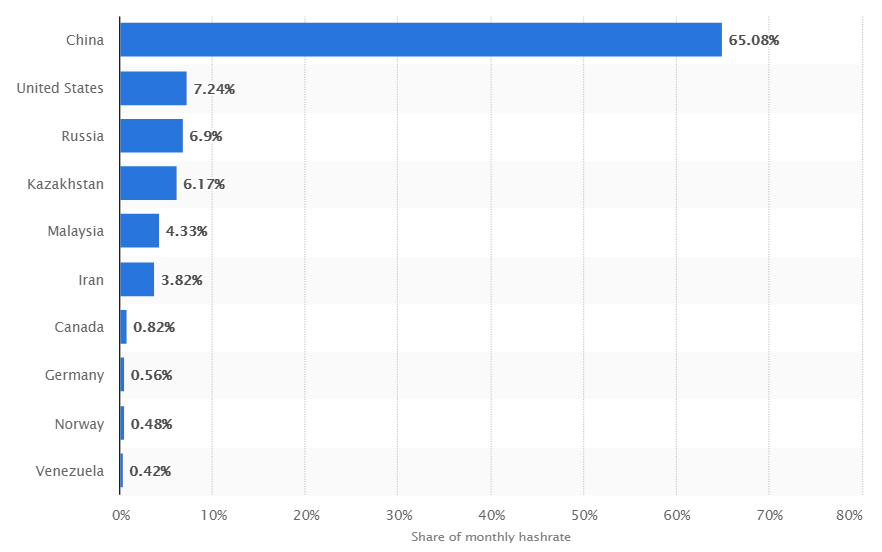If you’re keeping up with cryptocurrency developments, you might face various uncertainties. A common question for those new to the world of crypto is about the legality of bitcoin mining in their region. Furthermore, it’s crucial to understand which countries hold a favorable view towards cryptocurrencies, ensuring that bitcoin mining remains legal in the long term.
Maximizing profitability in bitcoin mining requires considering local electricity prices. Our guide explores the intricacies of bitcoin mining and highlights various regions where it is permitted.
Got something to say about mining or anything else? Write to us or join the discussion in our Telegram channel. You can also catch us on Tik Tok, Facebook, or Twitter.
What Is bitcoin mining?
For the uninitiated, the word “mining” obfuscates more than it reveals. However, it was chosen because mining denotes a great expenditure of resources to get to something valuable.
This is where the analogy between mining and cryptocurrency mining ends.
For a cryptocurrency like bitcoin, miners perform two key roles:
- Adding new coins — blocks to the blockchain
- Verifying transactions on the blockchain serves as auditors who simultaneously solve the problem of double-spending
For these roles, miners receive rewards in the form of bitcoin, called bitcoin block rewards. This is one way to acquire the cryptocurrency without buying it with money. You can also go through Stormgain’s free mining program to mine bitcoin without hardware.
In short, bitcoinbuy mining occurs when mining computers (rigs) solve complex equations every ten minutes. Those that solve it first add a new block to the blockchain. Then, the miner is rewarded with BTC.
Therefore, the issue of “is bitcoin legal” is rather moot when everyone can set up a computer in their home to mine it, but more on that later.
Is bitcoin mining still profitable?

If you were to buy a professional-grade mining rig, such as Whatsminer M21S, you would need to account for its hash power and expenditures to determine the daily profits. Let’s take the following factors, of which only electricity cost may differ based on your location:
- Hash power: 56 TH/s
- Power consumption: 3360W
- Current BTC price
- Electricity cost: 0.1 USD/kWh
Altogether, by using the previously mentioned calculator, you would earn:
- $11.46 per day
- $349.27 per month
- $4,249.41 per year
A single Whatsminer M21S machine would generate this net profit, which could be further improved if your electricity cost is lower — solar, hydroelectric dam, subsidies, etc. Nowadays, companies have honed bitcoin mining to a science, which is why bitcoin miners keep seeing record profits despite the block reward halving.
/Related
More Articles
Of course, one cannot neglect to mention the biggest driver of bitcoin’s price — the Federal Reserve. During the last year, the Fed’s money-printing machine had gone into overdrive. Some estimate that about a quarter of all dollars were printed in one month than in two centuries. This massively devalues the dollar, which is likely to cause (hyper)inflation.
Using Bitcoin as a hedge against inflation is a major factor in its continued adoption by major institutional investors, such as MicroStrategy. They all count on the Fed to continue to devalue the USD. This will make more hedge funds invest in Bitcoin, turned off by negative yields from the bond market.
As a consequence, bitcoin’s price should keep rising, with some corrections, well into the following year. And as long as this continues, bitcoin mining will be profitable even on a minor, individual scale.
Lastly, if you want to build a mining rig out of retail PC components or check the hash power of your current PC, you can use this calculator.
Is bitcoin mining legal?
China’s central authorities instructed its provinces to cut wasteful energy consumption. As a result, Inner Mongolia, which is very rich in coal and gas, decided to ban all cryptocurrency mining. This represents a major setback for bitcoin mining because this one province held more bitcoin miners than the entire United States, at 8% of global mining.

In April 2021, Inner Mongolia was required to locate and shut down all cryptocurrency mining operations. Naturally, new mining projects were also not approved.
If you wonder if bitcoin mining is illegal, the answer is no. In fact, bitcoin has never been banned in China, only ICO projects since 2017.
While it is true that China doesn’t like crypto exchanges to operate within its territory, Beijing Arbitration Commission (BAC) still views cryptocurrencies as virtual commodities. In other words, cryptocurrencies are sanctioned only when they are used as currencies. Overall, to the question of is bitcoin mining is legal, it is best to answer where it is illegal.
Top countries where bitcoin is legal for mining
Only a few countries have made it explicitly illegal to mine bitcoin, and almost always on religious grounds. Among them are Egypt, Algeria, Morocco, Pakistan, Nepal, Bolivia, and Ecuador.
For example, in a Muslim country like Egypt, the Grand Mufti had issued a religious fatwa (prohibition) on cryptocurrencies because they are a form of usury. From the same angle but a different socialist field, a country like Ecuador or Bolivia adopted the same approach.
Otherwise, in most of the world, bitcoin mining is legal and treated as a commodity/property or crypto asset subject to capital gains tax. This would apply to non-fungible tokens (NFTs) as well. With this in mind, here are the countries best suited for bitcoin mining.
China
Yes, despite the recent mining ban in one of its provinces, China’s cheap coal is still a godsend for bitcoin miners. This is why almost 2/3 of all bitcoin mining is occurring in China.
However, now that Inner Mongolia has set a ban precedent, one should see a migration of miners into more friendly countries. Still, when it comes to electricity maximization, it’s difficult to beat China with its average of 0.084 per kWh.
Canada

You will be happy to know that bitcoin mining is legal in Canada. Unlike China, Canada checks all the boxes for a prosperous Bitcoin mining venture: electricity cost, regulatory stability, broadband internet, and cold climate. The latter greatly diminishes mining costs because nature provides its own cooling for most of the year. Canada’s national average temperature in 2019 was merely 1 Celsius.
When it comes to electricity, there is hardly a more cost-effective energy source than hydroelectric power. Quebec, in particular, has an appealing electricity infrastructure, which is why it has already attracted many Chinese miners. Canada’s commercial electricity cost sits at around $0.11 per kWh.
Iceland
Iceland stands out as a prime location for legal bitcoin mining thanks to its unique characteristics. The country harnesses energy from abundant geothermal plants, which also attract tourists. This sustainable energy source produces cheap electricity, costing approximately $0.13 per kWh for commercial use.
Additionally, Iceland’s sparse population is complemented by a friendly regulatory and political environment. With an average temperature of 1.75 Celsius, it offers an ideal, cost-effective cooling solution for mining operations. Moreover, Iceland boasts one of the highest internet connectivity rates in Europe.
Finland
In many ways, similar to Iceland, this Northern European country fully embraces legal Bitcoin mining and blockchain technology in whatever form it comes. Its average temperature is only slightly higher than Iceland’s, at 2.1 Celsius. Most importantly, its electricity cost for the commercial sector is also lower — at around $0.11 per kWh.
Finland owes this to its energy infrastructure, mostly consisting of nuclear and hydroelectric plants, along with natural gas and biofuel.
Sweden

Sweden is another country where bitcoin mining is legal. In addition to having a relatively cold climate and low electricity cost at $0.17 per kWh, Sweden has another huge advantage. The nation’s government treats bitcoin as a currency and is subject to the Finansinspektionen (Financial Supervisory Authority) regulations. The nation also has good internet connectivity.
With such a combo of factors, Sweden is a top choice for bitcoin miners. Unfortunately, Sweden’s political, security, and economic stability continues to deteriorate due to unlimited mass immigration. Consequently, it is difficult to see it as a part of the developed world within the next ten years.
How is bitcoin doing in general?
Additionally, the third halving of bitcoin, while initially causing concern due to lower block rewards, has led to bitcoin’s longest bullrun to date. This ongoing trend has enabled bitcoin to consistently break through various price barriers, offering miners a unique opportunity for substantial earnings.
What the future holds for bitcoin mining
To maximize bitcoin mining effectively, miners must consider the cost of electricity, access to high-speed internet, a cold climate for efficient cooling, and a crypto-friendly political climate with supportive legislation. Meanwhile, retail bitcoin miners’ success hinges on the availability and efficiency of ASIC mining rigs, which must balance hash power with power consumption, paralleling the rising demand and value of bitcoin.
In conclusion, the dynamic world of bitcoin mining requires not only technical expertise but also a strategic approach to external factors. By staying informed about global trends, regulatory changes, and technological advancements, miners can navigate the challenges and capitalize on the opportunities in this evolving market.
< Previous In Series | Mining | Next In Series >
Frequently asked questions
Is bitcoin mining legal in China?
Where is bitcoin mining illegal?
Does bitcoin mining give you real money?
Where is bitcoin mining legal?
Which mining sites are legit?
Which is the cheapest country to mine bitcoin?
Which country is best to mine for bitcoin?
Does bitcoin mining cause damage?
Trusted
Disclaimer
In line with the Trust Project guidelines, the educational content on this website is offered in good faith and for general information purposes only. BeInCrypto prioritizes providing high-quality information, taking the time to research and create informative content for readers. While partners may reward the company with commissions for placements in articles, these commissions do not influence the unbiased, honest, and helpful content creation process. Any action taken by the reader based on this information is strictly at their own risk. Please note that our Terms and Conditions, Privacy Policy, and Disclaimers have been updated.









